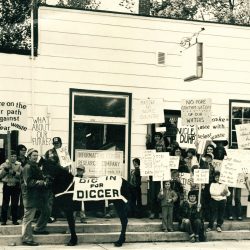A complex album from Toronto’s Casper Skulls that takes them in a new musical direction and deals with coming to terms with traumatic memories.
 As residents of Toronto will proudly point out, their city is one of the most diverse in the country, if not on the entire continent. Casper Skulls’ founders and core members Neil Bednis and vocalist-guitarist Melanie St.-Pierre are originally from the mid-sized city of Sudbury in Northern Ontario and formed the band in 2015, taking their name from Richard Hell and Tom Verlaine’s poetry nom de plume “Caspar Skull.”
As residents of Toronto will proudly point out, their city is one of the most diverse in the country, if not on the entire continent. Casper Skulls’ founders and core members Neil Bednis and vocalist-guitarist Melanie St.-Pierre are originally from the mid-sized city of Sudbury in Northern Ontario and formed the band in 2015, taking their name from Richard Hell and Tom Verlaine’s poetry nom de plume “Caspar Skull.”
Casper Skulls’ first album ‘Mercy Works’ was a noisy, shoegazy release in 2017. Tokyo Police Club’s Graham Wright included the band in his 2019 list of Toronto’s best indie artists for Brooklyn’s AdHoc publication for concert promoters, although he mentioned that he liked them when they were a “zippier post punk band.”
Their sound has evolved on their democratically written, self-produced second album to storytelling indie folk/alt country. Making the move to very personal songwriting from more removed and abstract indie rock, St.-Pierre writes about her experiences growing up in Sudbury and Massey, a very small town in Ontario. Her grandmother, an influential figure in her life, gave up her aspirations of living and working as an artist in Toronto to raise a family in Massey 400 km away. St.-Pierre did the opposite: heading to Toronto to pick up where her grandmother left off.
Like Corin Tucker from Sleater-Kinney, St.-Pierre is able to write beautifully melodic and intriguing songs about perfectly awful things. The harrowing “Witness” is about the trauma of witnessing the murder of her best friend’s father and then having to testify during the trial. Anyone who has had to deal with the maddeningly slow trudge of the legal process in such a case knows the gut-wrenching, compounding trauma that it can be. She expresses bitterness and rage at having to go through what she did as a child, instilling a profound fear of death in her. Murder ballads are part and parcel of Americana, of course, but the sweetness of the soft folk song that immediately follows, “Rose of Jericho,” is jarring by comparison.
“The Mouth” is about a small park in Massey, Ontario, where St.-Pierre’s grandmother would take her to swim as a child. Her grandmother also protested against environmental damage to this park, with a photo from one of the public protests used as the album cover. “Proem” harkens back to the band’s earlier sound, with My Bloody Valentine-like expressionistic guitar. Newly recruited drummer Aurora Bangarth provides a subtle and reassuring backbone behind the drama. It seems like they want to commit to going full lyric-driven alt-country but are keeping one foot in indie rock.
There is plenty of confident songwriting here and stories to tell, but unfortunately the lyrics are frequently not easily or immediately discernible. The raw expression seems to take a lot out of St.-Pierre, sometimes leaving her sounding tired, as though she has carried a heavy burden for a long time and would very much like to put it down now, thanks.
The stellar title track is from a Georgia O’Keeffe quote about the sun-bleached bones and other small found objects the painter collected in the New Mexico desert: “The bones seem to cut sharply to the center of something that is keenly alive on the desert even though it is vast and empty and untouchable – and knows no kindness with all its beauty.”



